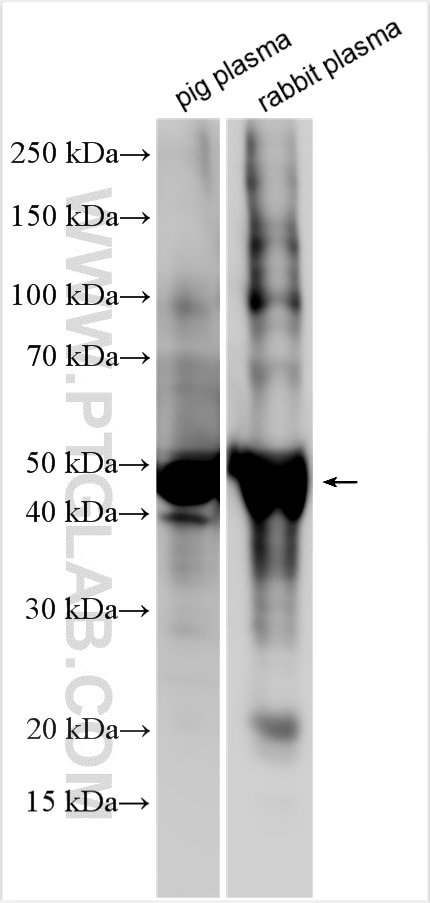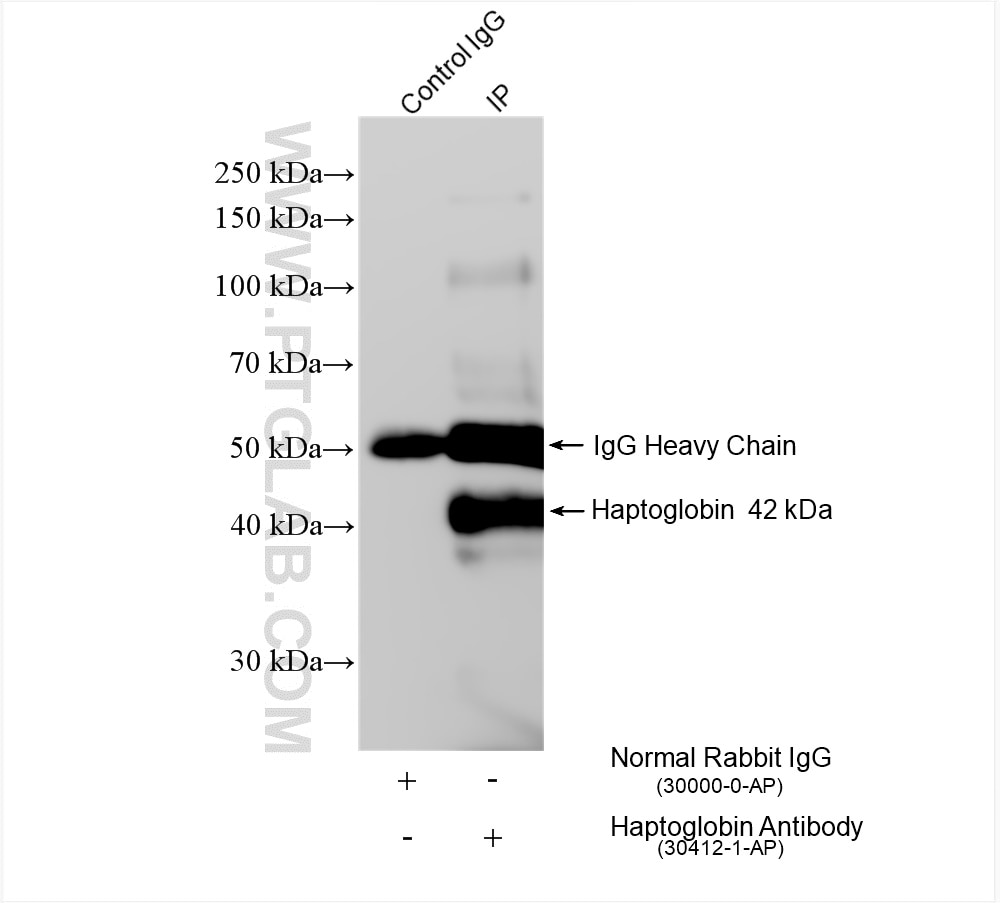Haptoglobin Polyklonaler Antikörper
Haptoglobin Polyklonal Antikörper für WB, IP, ELISA
Wirt / Isotyp
Kaninchen / IgG
Getestete Reaktivität
Hausschwein, human, Kaninchen, Ratte
Anwendung
WB, IP, ELISA
Konjugation
Unkonjugiert
Kat-Nr. : 30412-1-AP
Synonyme
Geprüfte Anwendungen
| Erfolgreiche Detektion in WB | rabbit blood tissue, pig plasma, rabbit plasma |
| Erfolgreiche IP | human plasma |
Empfohlene Verdünnung
| Anwendung | Verdünnung |
|---|---|
| Western Blot (WB) | WB : 1:2000-1:12000 |
| Immunpräzipitation (IP) | IP : 0.5-4.0 ug for 1.0-3.0 mg of total protein lysate |
| It is recommended that this reagent should be titrated in each testing system to obtain optimal results. | |
| Sample-dependent, check data in validation data gallery | |
Produktinformation
30412-1-AP bindet in WB, IP, ELISA Haptoglobin und zeigt Reaktivität mit Hausschwein, human, Kaninchen, Ratten
| Getestete Reaktivität | Hausschwein, human, Kaninchen, Ratte |
| Wirt / Isotyp | Kaninchen / IgG |
| Klonalität | Polyklonal |
| Typ | Antikörper |
| Immunogen | Rekombinantes Protein |
| Vollständiger Name | haptoglobin |
| Beobachtetes Molekulargewicht | 36-45 kDa |
| GenBank-Zugangsnummer | BC121125 |
| Gene symbol | HP |
| Gene ID (NCBI) | 3240 |
| Konjugation | Unkonjugiert |
| Form | Liquid |
| Reinigungsmethode | Antigen-Affinitätsreinigung |
| Lagerungspuffer | PBS with 0.02% sodium azide and 50% glycerol |
| Lagerungsbedingungen | Bei -20°C lagern. Nach dem Versand ein Jahr lang stabil Aliquotieren ist bei -20oC Lagerung nicht notwendig. 20ul Größen enthalten 0,1% BSA. |
Hintergrundinformationen
Haptoglobin is also named as Zonulin and belongs to the peptidase S1 family. Haptoglobin is an alpha-2-glycoprotein synthesized mainly by hepatocytes consisting of both alpha and beta subunits linked by disulfide bonds forming dimers (PMID: 4018023). Haptoglobin is primarily produced in the liver, and when red cells are lysed in vivo, free hemoglobin binds to circulating haptoglobin; the hemoglobin-haptoglobin complex is then degraded by the reticuloendothelial system (PMID: 24809098). Because haptoglobin levels become depleted in the presence of large amounts of free hemoglobin, decreased haptoglobin is a marker of hemolysis. The human haptoglobin (HP) gene exists in two major allelic forms leading to three major genotypes: Hp1-1, Hp2-1, and Hp-2-2, that separate on alkaline starch gel electrophoresis due to different molecular weights (PMID: 17474882). Their properties vary in binding strength, anti-oxidative ability, and rate of clearance. Binding strength is greatest with Hp1-1, but the Hp-2 genotypes can bind a larger number of hemoglobin alpha-beta dimers. Complexes of Hp2-2 and hemoglobin have higher affinity for the CD163 receptor, the monocyte-macrophage receptor that facilitates its clearance. Neutrophils contained a large amount of highly glycosylated Hp (β-chain 45-65 kDa) synthesized in neutrophil precursors and stored in specific granules and a small amount of Hp (β-chain 39 kDa) endocytosed from plasma and stored in secretory vesicles (PMID: 16543473).
Protokolle
| PRODUKTSPEZIFISCHE PROTOKOLLE | |
|---|---|
| WB protocol for Haptoglobin antibody 30412-1-AP | Protokoll herunterladen |
| IP protocol for Haptoglobin antibody 30412-1-AP | Protokoll herunterladen |
| STANDARD-PROTOKOLLE | |
|---|---|
| Klicken Sie hier, um unsere Standardprotokolle anzuzeigen |




